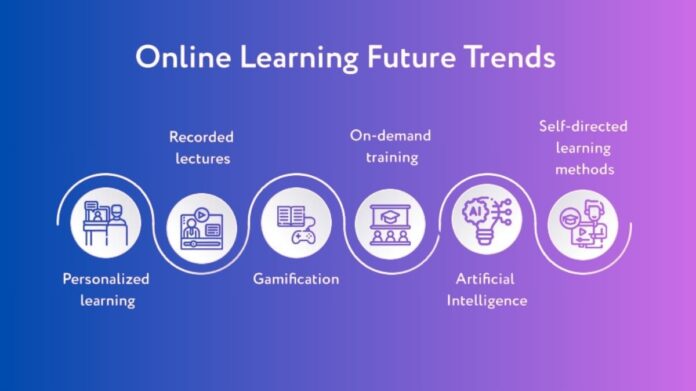E learning trends
Technological improvements and changing learner expectations have transformed education. Once a supplement, e-learning is now a primary education method for many. Several schooling trends are emerging from this shift. This article discusses these trends’ effects and possibilities.
E-learning trends 2024
Personalized Education
Personalization adapts education to individual needs, interests, and talents. E-learning platforms may customize material and learning paths using data analytics and AI. For instance, adaptive learning systems monitor student performance and adjust material and difficulty.
Benefits:
- Relevance to interests and understanding keeps students interested.
- Results: Personalised learning helps detect and address learning gaps, improving academic achievement.
Challenges:
- Privacy: Personal data presents security and privacy concerns.
- Development and maintenance of adaptive learning systems are expensive and time-consuming.
Microlearning
Microlearning delivers little, digestible pieces of material. This trend enables professionals and adult learners fit learning into their busy schedules. Microlearning courses usually include 10-15 minute films, quizzes, and interactive exercises.
Benefits:
- It’s easier to balance studying with other responsibilities when learners may access content at their convenience.
- Information retention and cognitive overload are improved by short, targeted learning sessions.
Challenges:
- For complicated subjects that require in-depth study, microlearning may not be suitable.
- Integration: Aligning microlearning modules with learning goals is difficult.
Gamification
Gamification makes learning fun by adding game design features. Leaderboards, badges, and points are examples. Achievement and competitiveness drive students.
Benefits:
- Gamification motivates students by appealing to their inherent desire for success and competition.
- Increased Engagement: Fun and interactive learning can boost participation.
Challenges:
- Rewards Overemphasis: Students may choose rewards over learning.
- Implementation complexity: Effective gamified experiences involve preparation and design skills.
Mobile learning
Mobile learning (m-learning) has grown with smartphones and tablets. M-learning makes learning easier by letting students access content anytime, anyplace.
Benefits:
- Quality education is available to remote and underserved students via mobile devices.
- Flexible: Learners can study during commutes or breaks.
Challenges:
- Device Limitations: Mobile devices’ small screens and processing power can hamper learning.
- Connectivity: M-learning requires reliable internet access, which can be difficult in some areas.
Virtual Reality (VR) and Augmented Reality (AR)
E-learning is becoming more immersive and engaging with Virtual Reality(VR) and Augmented Reality (AR). VR can simulate medical and engineering, while AR can overlay digital information on the real environment to improve learning.
Benefits:
- Virtual and augmented reality enhance learning by providing hands-on experience and practical application.
- Engagement: These technologies generate student interest through interactive learning.
Challenges:
- Excellent VR and AR equipment and content development are costly.
- Technological Challenges: These technologies require strong technological infrastructure and knowledge.
Social learning
Social learning enhances education through social contact. Online discussion forums, social media, and collaborative projects help students learn, share, and think critically.
Benefits:
- Collaboration: Promotes student teamwork and learning.
- Peer interactions promote critical thinking and problem-solving in social learning situations.
Challenges:
- Facilitating productive and courteous conversations involves moderation.
- If misused for teaching, social media can be distracting.
Artificial Intelligence(AI)
Autonomous administrative duties, intelligent tutoring, and personalised learning are revolutionising e-learning with Artificial Intelligence. Artificial Intelligence can analyse big data to reveal student performance and learning habits.
Benefits:
- Efficiency: Grading and administrative activities can be automated by Artificial Intelligence, letting teachers focus on teaching.
- AI-driven analytics can personalise learning for each student.
Challenges:
- Data privacy and algorithmic prejudice are ethical concerns with Artificial Intelligence.
- Dependency: Artificial Intelligence overuse can lessen human educators’ role.
Blended Learning
Blended learning mixes online and face-to-face training. This method offers flexibility and direct teacher-student connection.
Benefits:
- Students can learn in-person or online, allowing different learning styles.
- By mixing teaching approaches, blended learning offers a more complete education.
Challenges:
- Effective blended learning programmes require careful design and resource allocation.
- Making sure all pupils have the right tech can be difficult.
Lifetime Learning
Lifelong learning emphasizes on-going education and skill development. A variety of e-learning courses lets people master new skills or upgrade old ones at their own speed.
Benefits:
- Career advancement: Learning new skills through lifelong learning keeps people competitive.
- Lifelong Learning: Learning enhances personal and intellectual growth.
Challenges:
- High motivation and discipline are needed for self-directed learning.
- Quality Assurance: Online course credibility is tough to ensure.
E learning trends for the future
As technology and learner demands change, e-learning is altering education. Personalised learning, microlearning, gamification, mobile learning, VR and AR, social learning, AI, blended learning, and lifelong learning are making education more accessible, engaging, and effective. To reach their full potential, these trends must overcome obstacles. E-learning will increasingly play a significant role in offering quality education to learners globally, adjusting to their requirements and preparing them for the future.


